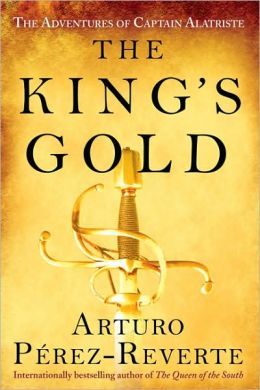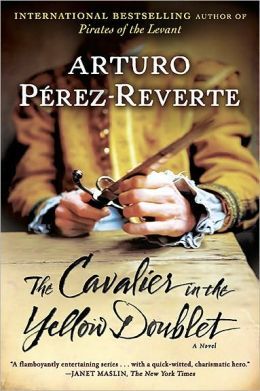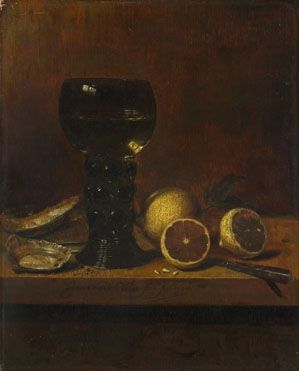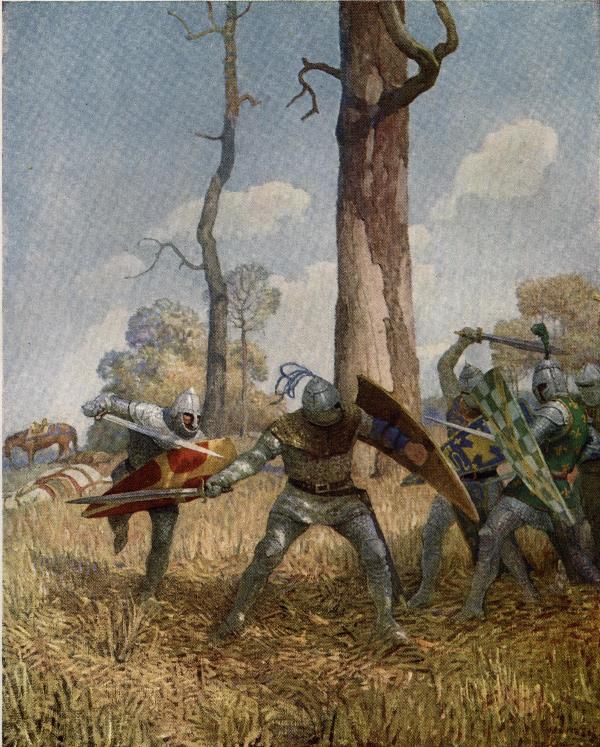Monday, September 30, 2013
Hiatus
Fall television shows may be starting anew, but I'm taking the week off - lots of real-life stuff to catch up on at the moment.
Monday, September 23, 2013
How to Referee, Part 3: Vin Scully Edition
I have two favorite baseball teams: the San Francisco Giants and whoever is beating the Dodgers.
I viscerally dislike anything to do with the Dodgers, with just two exceptions: Dodger Stadium, which, despite repeated attempts to trash it up, remains a wonderful place to watch a baseball game, and Vin Scully, the Voice of Summer.
My grandfather was a recording engineer, and he gave me my first transistor radio, with its single button earpiece, and with that radio, and the succession of radios which followed after I'd break or lose one, I would listen to Vin Scully and Jerry Doggett's call on KFI and later KABC in bed at night - and if the vagaries of the atmosphere were working against me, I'd spin the tuning knob to the other end of the dial and listen to Jaime Jarrin on KWKW instead. (Stan Ridgeway wrote "Mexican Radio" for me, or at least that's the way it seemed the first time I heard it.) Like many other fans, I would take that same transistor radio to Dodger Stadium each year when I'd go see games with my dad, to listen to Scully's call even as I was watching the game live.
A ton of ink was spilled over many years describing what makes Vin Scully the dean of sportscasters, but here are the things that stand out for me: meticulous preparation, a deep understanding of the game - unlike most sportscasters, he doesn't work with a retired ballplayer as a 'color man' - and an unequaled ability to extemporize amazing prose. In a post on his blog, the Giants' Jon Miller - no slouch in the broadcast booth himself - writes about Scully's call of Sandy Koufax's perfect game:
The very best of them do it all so well that they sound like they're reading from a script, even while they're making it up as they go.
Preparation and an understanding of the game to extemporize a narrative in real-time from unpredictable events. That, for me, is the heart of refereeing.
No one will every confuse me with Vin Scully - I'm more like the "boom goes the dynamite" guy - but it's what I aspire to.
I viscerally dislike anything to do with the Dodgers, with just two exceptions: Dodger Stadium, which, despite repeated attempts to trash it up, remains a wonderful place to watch a baseball game, and Vin Scully, the Voice of Summer.
My grandfather was a recording engineer, and he gave me my first transistor radio, with its single button earpiece, and with that radio, and the succession of radios which followed after I'd break or lose one, I would listen to Vin Scully and Jerry Doggett's call on KFI and later KABC in bed at night - and if the vagaries of the atmosphere were working against me, I'd spin the tuning knob to the other end of the dial and listen to Jaime Jarrin on KWKW instead. (Stan Ridgeway wrote "Mexican Radio" for me, or at least that's the way it seemed the first time I heard it.) Like many other fans, I would take that same transistor radio to Dodger Stadium each year when I'd go see games with my dad, to listen to Scully's call even as I was watching the game live.
A ton of ink was spilled over many years describing what makes Vin Scully the dean of sportscasters, but here are the things that stand out for me: meticulous preparation, a deep understanding of the game - unlike most sportscasters, he doesn't work with a retired ballplayer as a 'color man' - and an unequaled ability to extemporize amazing prose. In a post on his blog, the Giants' Jon Miller - no slouch in the broadcast booth himself - writes about Scully's call of Sandy Koufax's perfect game:
Vin’s call of that game later became nearly as famous as the game itself. Charlie Einstein, who used to be a columnist here in San Francisco, came out with a book every few years called the "The Fireside Book of Baseball." It was a compilation of the best baseball writing in recent years – columns, feature stories, well-written game stories. In one edition, he included a transcript of Vin Scully’s ninth-inning call of Koufax’s perfect game.Many gamers compare refereeing to being a writer or a director, and I always cringe when I read or hear those analogies. If I have to use a movie analogy at all, I prefer to think of myself as the location manager, the set dresser, and the production assistant assigned to hear the extras around. But at the table, during actual play, I'm a sportscaster; at least, that's my goal. Sportscasters know the teams and the players, the stats and the standings and the scouting reports, but once the ball is in play, they must respond to the action as it happens, whereever that action may take them. Sometimes they get a tight game, seesawing back and forth; sometimes they're dealt a blowout, and to me the sternest test of a sportscaster is the ability to keep me listening when my team is just getting worked. And sometimes they get to be the voice of history itself.
All the sentences are grammatically correct, elegant, descriptive and filled with the drama and tension of the moment. But it was totally extemporaneous as the action unfolded in front of him. No chance to ponder it after the fact and say, "This would be a good line."
The very best of them do it all so well that they sound like they're reading from a script, even while they're making it up as they go.
Preparation and an understanding of the game to extemporize a narrative in real-time from unpredictable events. That, for me, is the heart of refereeing.
No one will every confuse me with Vin Scully - I'm more like the "boom goes the dynamite" guy - but it's what I aspire to.
Sunday, September 22, 2013
The Pen and the Sword: The King's Gold
A cry of alarm rang out above our heads, and when I looked up, I saw a face peering down at us, half lit by the lantern. The expression on the man's face was one of horror, as if unable to believe his eyes, as he watched us climbing toward him. He may have died still not believing, because Captain Alatriste, who had reached him by then, stuck his dagger in his throat, right up to the hilt, and the man disappeared from view. Now more voices could be heard above, and the sound of people running about below-decks. A few heads peeped cautiously out from the gunports and immediately drew back, shouting in Flemish. The captain's boots scuffed against my face when he reached the top and jumped onto the deck. At that moment, another face appeared over the edge, a little farther off, on the quarterdeck; we saw a lit fuse, then a flash, and a harquebus shot rang out; something very hard and fast ripped past us, ending in a squelch of pierced flesh and broken bones. Someone beside me, climbing up from the boat, fell backward into the sea with a splash, but without uttering a word.
"Go on! Keep going!" shouted the men behind me, driving one another onward.
Teeth gritted, head hunched right down between my shoulders, I climbed what remained of the ladder as quickly as possible, clambered over the edge, stepped onto the deck, and immediately slipped in a huge puddle of blood. I got to my feet, sticky and stunned, leaning on the motionless body of the dead sailor, and behind me the bearded face of Bartolo Cagafuego appeared over the edge, his eyes bluging with tension, his gap-toothed grimace made even fiercer by the enormous machete gripped between his few remaining teeth. We were standing at the foot of the mizzenmast, next to the ladder that led up to the quarterdeck. More of our group had now reached the deck via the ropes secured by grappling hooks, and it was a miracle that the whole galleon wasn't awake to give us a warm welcome, what with that single harquebus shot and the racket made by sundry noises - the clatter of footsteps and the hiss of swords as they left their sheaths.
I took my sword in my right hand and my dagger in my left, looking wildly about in search of the enemy. And then I saw a whole horde of armed men swarming on the deck from down below, and I saw that most were as blond and burly as the men I had known in Flanders, and that there were more of them to the stern and in the waist, between the quarterdeck and the forecastle, and I saw as well that there were far too many of them, and that Captain Alatriste was fighting like a madman to reach the quarterdeck. I rushed to help my master, without waiting to see if Cagafuego and the others were following or not. I did so muttering the name of Angélica as a final prayer, and my last lucid thought, as I hurled myself into the fight with a furious howl, was that if Sebastián Copons did not arrive in time, the Niklaasbergen adventure would be our last.
"Go on! Keep going!" shouted the men behind me, driving one another onward.
Teeth gritted, head hunched right down between my shoulders, I climbed what remained of the ladder as quickly as possible, clambered over the edge, stepped onto the deck, and immediately slipped in a huge puddle of blood. I got to my feet, sticky and stunned, leaning on the motionless body of the dead sailor, and behind me the bearded face of Bartolo Cagafuego appeared over the edge, his eyes bluging with tension, his gap-toothed grimace made even fiercer by the enormous machete gripped between his few remaining teeth. We were standing at the foot of the mizzenmast, next to the ladder that led up to the quarterdeck. More of our group had now reached the deck via the ropes secured by grappling hooks, and it was a miracle that the whole galleon wasn't awake to give us a warm welcome, what with that single harquebus shot and the racket made by sundry noises - the clatter of footsteps and the hiss of swords as they left their sheaths.
I took my sword in my right hand and my dagger in my left, looking wildly about in search of the enemy. And then I saw a whole horde of armed men swarming on the deck from down below, and I saw that most were as blond and burly as the men I had known in Flanders, and that there were more of them to the stern and in the waist, between the quarterdeck and the forecastle, and I saw as well that there were far too many of them, and that Captain Alatriste was fighting like a madman to reach the quarterdeck. I rushed to help my master, without waiting to see if Cagafuego and the others were following or not. I did so muttering the name of Angélica as a final prayer, and my last lucid thought, as I hurled myself into the fight with a furious howl, was that if Sebastián Copons did not arrive in time, the Niklaasbergen adventure would be our last.
Friday, September 20, 2013
A Very Special DVR Alert
On Monday night - Tuesday morning, actually - TCM will show Lotte Reiniger's 1926 silent animated feature The Adventures of Prince Achmed.

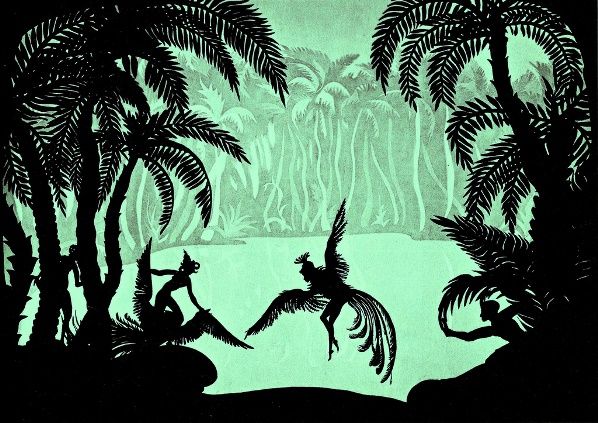
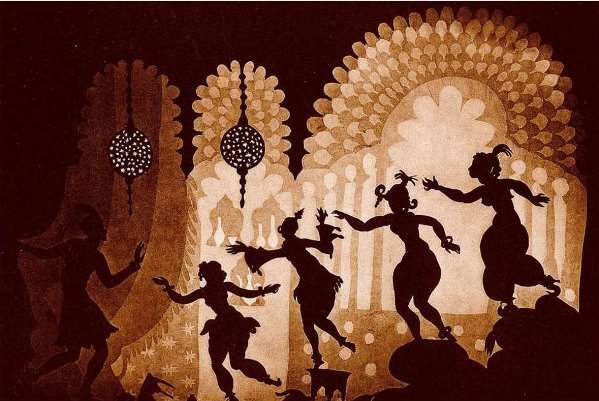

This is my favorite fantasy film, bar none, a tale of a witch and a wizard, a warrior and a swan princess, an emperor and a sultan, dancing girls and carnival acrobats, Sinbad and a mechanical flying horse, told entirely in silhouettes. It is a visually arresting movie, the first feature film I could get the Cabin Girl and Boy to sit through from start to finish.




This is my favorite fantasy film, bar none, a tale of a witch and a wizard, a warrior and a swan princess, an emperor and a sultan, dancing girls and carnival acrobats, Sinbad and a mechanical flying horse, told entirely in silhouettes. It is a visually arresting movie, the first feature film I could get the Cabin Girl and Boy to sit through from start to finish.
Thursday, September 19, 2013
Wednesday, September 18, 2013
Wednesday Wyeth
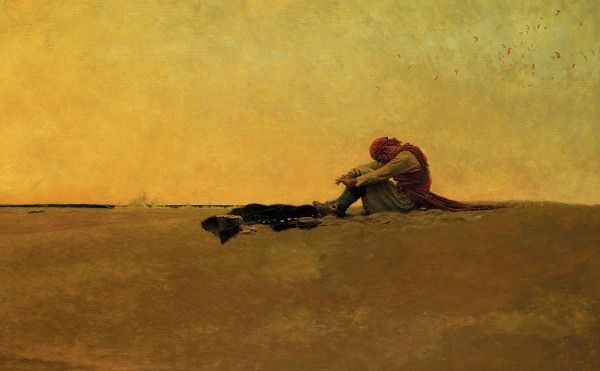
Standing in for NC Wyeth this week is Howard Pyle, the dean of pirate painters, with a marooned swab contemplating his fate.
Tuesday, September 17, 2013
"The pass to Bourbon . . . Slapshot! . . . GOAL!"
The capacity for human creativity never fails to amaze me.
Browsing deviantART earlier today, I stumbled across ~KM-Mafia's page at dA and his gallery of historical hockey sweaters, including four from the 17th century.
Kingdom of France

Holy Roman Empire

Polish-Lithuanian Commonwealth

Commonwealth of England, Scotland, and Ireland

That a Canadian would think of hockey sweaters is utterly unremarkable. To pair them with extinct states? I would never think of that, and now, after seeing them, I can't STOP thinking about them. I would buy the whole set if someone would make them.
Browsing deviantART earlier today, I stumbled across ~KM-Mafia's page at dA and his gallery of historical hockey sweaters, including four from the 17th century.
Kingdom of France

Holy Roman Empire

Polish-Lithuanian Commonwealth

Commonwealth of England, Scotland, and Ireland

That a Canadian would think of hockey sweaters is utterly unremarkable. To pair them with extinct states? I would never think of that, and now, after seeing them, I can't STOP thinking about them. I would buy the whole set if someone would make them.
Monday, September 16, 2013
Lazy Monday Link Dump
Rough night last night, and I'm wiped tonight. Going a night without sleep wasn't a problem when I was younger; now, I'm wrecked the next day.
Nate at d20 Pirates has a simple set of system-free rules for handling dehydration and starvation - being marooned on a desert island gets nastier, more brutal, and much, much shorter.
DHBoggs at Hidden in Shadows explores the similarities between D&D magic and the magic found in Shakespeare. I really enjoyed this post.
Eric Treasure at The Dragon's Flagon has a great post on the diverse interpretation of reaction rolls - another great random tool.
And last, at Bayuca, the blog I want RBE to be when it grows up, is a (p)review of A Field in England, a combination historical thriller and psychodelic movie set during the English Civil War. Any further explanation would be wasted - just click the link and check out the trailer.
Nate at d20 Pirates has a simple set of system-free rules for handling dehydration and starvation - being marooned on a desert island gets nastier, more brutal, and much, much shorter.
DHBoggs at Hidden in Shadows explores the similarities between D&D magic and the magic found in Shakespeare. I really enjoyed this post.
Eric Treasure at The Dragon's Flagon has a great post on the diverse interpretation of reaction rolls - another great random tool.
And last, at Bayuca, the blog I want RBE to be when it grows up, is a (p)review of A Field in England, a combination historical thriller and psychodelic movie set during the English Civil War. Any further explanation would be wasted - just click the link and check out the trailer.
Sunday, September 15, 2013
The Pen and the Sword: The Cavalier in the Yellow Doublet
He decided to finish the business, although not so hastily that it might work against him. Besides, there was no point in complicating his life further by killing a man in broad daylight, and on a Sunday. His opponent made a lunge, which Alatriste parried, making as if to deliver a straightforward blow, but instead shifting to the right, lowering his own sword to protect his chest and, in passing, dealing the other man an ugly cut to the head with his dagger. A bystander might have described his as both unorthodox and somewhat underhand, but there were no bystanders. Besides, María de Castro would already be on stage, and it was still a fair walk to the Corral de la Cruz. This was no time for niceties. More importantly, the strategy has worked. The young man turned pale and fell to his knees, bright red blood gushing from his temple. He had dropped his dagger was resting all his weight on his sword, which buckled slightly beneath him. Alatriste sheathed his own sword, then went over and disarmed the man by gently kicking the blade from under him. Then he held him up so he wouldn't fall, took a clean handkerchief from the sleeve of his doublet and bandaged the gash in the man's head as best he could.
"Will you be all right on your own?" he asked.
The young man looked at him, confused, but did not reply. Alatriste snorted impatiently.
"I have things to do," he said.
"Will you be all right on your own?" he asked.
The young man looked at him, confused, but did not reply. Alatriste snorted impatiently.
"I have things to do," he said.
Friday, September 13, 2013
Here Be Monsters
At Thoul's Paradise, perdustin posted a copy of a beautiful map of Iceland c. 1590, which includes a bestiary of sea monsters believed to infest the waters of the North Atlantic.
Two things jump out at me. First, the map includes features such as ice and trees, the latter described as windthrow from Norway. I like encounter tables which include features like this, both for local color which brings life to the setting and to provide the players with a potential resource to tap for their own schemes.
Second, it's a reminder of how superstitious the late Renaissance and Early Modern world remains. This map is dated just 36 years before the present year of my campaign. We haven't yet reached the cusp of the Enlightenment, and monsters and witchcraft are still accepted as real by many in the game-world. Stories of mythical beasts, rumors of dark arts - these, too, bring the setting to life, particularly when myths and mysteries have a basis in fact which can appear as well, as with the giant squid in Michael Crichton's Pirate Latitudes.
Two things jump out at me. First, the map includes features such as ice and trees, the latter described as windthrow from Norway. I like encounter tables which include features like this, both for local color which brings life to the setting and to provide the players with a potential resource to tap for their own schemes.
Second, it's a reminder of how superstitious the late Renaissance and Early Modern world remains. This map is dated just 36 years before the present year of my campaign. We haven't yet reached the cusp of the Enlightenment, and monsters and witchcraft are still accepted as real by many in the game-world. Stories of mythical beasts, rumors of dark arts - these, too, bring the setting to life, particularly when myths and mysteries have a basis in fact which can appear as well, as with the giant squid in Michael Crichton's Pirate Latitudes.
Thursday, September 12, 2013
Dividends
Random tables, at their best, inspire, and creating random tables is a way of banking inspiration for a rainy day.
Last weekend one of my non-player characters, the vicomte de Bouvard, hosted a fencing exhibition with the adventurers as his guests. A series of mock duels, with blunted swords and padded doublets, ensued, culminating in a match between Riordan O'Neill, recently appointed fencing master to the King's Musketeers, and Lieutenant Ponceau, fencing master to a company of musketeers in the Picardy Regiment.
I knew the duel between Riordan and Ponceau would be epic; one of the features of the dueling rules in Flashing Blades is that it's very difficult for a pair of master fencers to actually hit one another, and with the constraints of the 'exhibition' - no brawling, no dirty tricks - basically it would come down to fumbles and perhaps fatigue.
But in creating Ponceau, I figured out another tactic, taken from the second entry from annoying habits of duelists random table. Ponceau was given a high Endurance score and the Carousing skill, granting him a considerable capacity for drink. When the duel opened, Ponceau immediately called for a glass of wine for both men, tossing the empty glasses into a nearby fountain. And did so again after a touch by Riordan. And after a particularly elegant exchange of attacks and parries.
In short order, Riordan, the better fencer, was drunk and his advantage reduced. With each subsequent round of toasts, he struggled simply to stay awake and on his feet, eventually winning the contest despite his besotted state and adding to his burgeoning reputation as the best swordsman in France.
The simple act of writing stuff down pays dividends.
Last weekend one of my non-player characters, the vicomte de Bouvard, hosted a fencing exhibition with the adventurers as his guests. A series of mock duels, with blunted swords and padded doublets, ensued, culminating in a match between Riordan O'Neill, recently appointed fencing master to the King's Musketeers, and Lieutenant Ponceau, fencing master to a company of musketeers in the Picardy Regiment.
I knew the duel between Riordan and Ponceau would be epic; one of the features of the dueling rules in Flashing Blades is that it's very difficult for a pair of master fencers to actually hit one another, and with the constraints of the 'exhibition' - no brawling, no dirty tricks - basically it would come down to fumbles and perhaps fatigue.
But in creating Ponceau, I figured out another tactic, taken from the second entry from annoying habits of duelists random table. Ponceau was given a high Endurance score and the Carousing skill, granting him a considerable capacity for drink. When the duel opened, Ponceau immediately called for a glass of wine for both men, tossing the empty glasses into a nearby fountain. And did so again after a touch by Riordan. And after a particularly elegant exchange of attacks and parries.
In short order, Riordan, the better fencer, was drunk and his advantage reduced. With each subsequent round of toasts, he struggled simply to stay awake and on his feet, eventually winning the contest despite his besotted state and adding to his burgeoning reputation as the best swordsman in France.
The simple act of writing stuff down pays dividends.
Wednesday, September 11, 2013
Wednesday Wyeth

My five-hundredth post. A lot of bloggers take this milestone as a chance to reflect. I'm just going to enjoy the scenery instead.
Tuesday, September 10, 2013
Meditation on a Visit to a Game Store
Last Sunday I stopped at Game Empire in Pasadena.
First, let me say that Game Empire is what other gaming stores should aspire to be. The retail space is well-stocked but not unnecessarily cluttered. They have current games and an out-of-print section. There are board games - including a wall of games recommended on Board Game Geek - and roleplaying games and puzzles and dice. There are miniatures and paints. The vast play area has miniatures terrain for use by visiting gamers. The staff member was helpful and knowledgeable. It's a beautiful store.
But as I thumbed through books and studied boxes, I was struck by something I hadn't really noticed so obviously before: trade dress is more important than content.
I looked at Bruges, and was struck by how much it reminded me of a dozen other resource management and strategy games, such as Doge, which I already own. Change the tokens, the cards, and the nominal setting and Bruges could be set in Antwerp or a dozen other cities as easily as Doge could be set in Livorno or Amsterdam or anyplace else with canals. Most of the games weren't about anything but rules of incredible sameness, and the trade dress of pirates and merchanters or Renaissance traders or whatever existed solely as window dressing.
On top of a book case full of Warhammer 40K books sat a copy of Avalon Hill's Starship Troopers, still in the shrink wrap - and only twenty-five bucks?! that's crazy cheap! All of the minis and army books and terrain and the meticulous and relentless art direction, just to offer the same bughunts as the board-game-in-a-box on top of the bookcase. In the future, there is only trade dress once again.
I flipped through FATE Core System. Talk about a game I really wanted to like but could never quite embrace. The core book reminded me why. Why are 'basic' roleplaying games so bloody involved? I've been playing for the better part of more than thirty-five years now, and if I'd had to read a rule book that big to start, I'd never've given up wargames. That point was reinforced when I got to our game later that day, and I pulled out my printed-out .pdfs for Flashing Blades - the core rules, the piracy supplement, and three adventures, all of which fit together in a term paper report cover. Our hobby is dominated by designers writing for existing gamers, and if this is supposed to attract new gamers, there's some serious delusion going on.
In the end, I bought some beautiful dice - two twenty-siders, two six-siders - the only products in that terrific store for which I had an actual use.
First, let me say that Game Empire is what other gaming stores should aspire to be. The retail space is well-stocked but not unnecessarily cluttered. They have current games and an out-of-print section. There are board games - including a wall of games recommended on Board Game Geek - and roleplaying games and puzzles and dice. There are miniatures and paints. The vast play area has miniatures terrain for use by visiting gamers. The staff member was helpful and knowledgeable. It's a beautiful store.
But as I thumbed through books and studied boxes, I was struck by something I hadn't really noticed so obviously before: trade dress is more important than content.
I looked at Bruges, and was struck by how much it reminded me of a dozen other resource management and strategy games, such as Doge, which I already own. Change the tokens, the cards, and the nominal setting and Bruges could be set in Antwerp or a dozen other cities as easily as Doge could be set in Livorno or Amsterdam or anyplace else with canals. Most of the games weren't about anything but rules of incredible sameness, and the trade dress of pirates and merchanters or Renaissance traders or whatever existed solely as window dressing.
On top of a book case full of Warhammer 40K books sat a copy of Avalon Hill's Starship Troopers, still in the shrink wrap - and only twenty-five bucks?! that's crazy cheap! All of the minis and army books and terrain and the meticulous and relentless art direction, just to offer the same bughunts as the board-game-in-a-box on top of the bookcase. In the future, there is only trade dress once again.
I flipped through FATE Core System. Talk about a game I really wanted to like but could never quite embrace. The core book reminded me why. Why are 'basic' roleplaying games so bloody involved? I've been playing for the better part of more than thirty-five years now, and if I'd had to read a rule book that big to start, I'd never've given up wargames. That point was reinforced when I got to our game later that day, and I pulled out my printed-out .pdfs for Flashing Blades - the core rules, the piracy supplement, and three adventures, all of which fit together in a term paper report cover. Our hobby is dominated by designers writing for existing gamers, and if this is supposed to attract new gamers, there's some serious delusion going on.
In the end, I bought some beautiful dice - two twenty-siders, two six-siders - the only products in that terrific store for which I had an actual use.
Monday, September 9, 2013
Random Encounters Coda: Order from Chaos
Alexander Macris, lead designer of Adventure Conqueror King System and co-founder of The Escapist magazine, published an article on the art of abductive reasoning in running a roleplaying game.
The foremost philosopher of abduction, Charles Sanders Peirce, summarized abduction as follows:Noting that abduction is the opposite of cause-and-effect - the effect is observed, and a cause suggested - the article goes on to describe the relationship to roleplaying games.
The surprising fact, C, is observed;
But if A were true, C would be a matter of course,
Hence, there is reason to suspect that A is true.
For instance, assume the surprising circumstance that my car won't start this morning. If it were true that my car battery were dead, then the fact that my car won't start would be a matter of course. So there is reason to suspect (abduce) that my car battery is dead.
The art of abduction depends on having a set of "weird facts", that is, a circumstance you need to explain. Fortunately, such facts are never in short supply. Indeed, the easiest and most accessible method of brainstorming available to any gamemaster is random generation of facts.I've been doing this for as long as I've played, but I never knew it had a name.
Sunday, September 8, 2013
The Pen and the Sword: The Cavalier in the Yellow Doublet
He knew that Saldaña was as placid as an ox in all matters but those concerning his wife. Then passion blinded him. Any jokes about how she had got him the post in exchange for favors granted to third parties – as malicious tongues would have it – quickened his pulse and clouded his reason. “With any luck,” thought Alatriste, “this will help me resolve the matter quickly.” He adjusted his grip, parried a thrust, withdrew a little to draw his opponent in, and, when their blades clashed again, he noticed that Saldaña already seemed less confident. He decided to return to the attack.
“I imagine she’ll be inconsolable,” he said, striking again. “She’ll doubtless wear deepest mourning.”
Saldaña did not reply, but he was breathing hard and muttered a curse when the furious barrage he had just unleashed slashed only thin air, sliding off the captain’s blade.
“Cuckold,” said Alatriste calmly, then waited.
Now he had him. He sensed him coming toward him in the dark, or rather he knew it from the gleam of steel from his sword, the sound of frantic footsteps, and the rancorous roar Saldaña let out as he attacked blindly.
“I imagine she’ll be inconsolable,” he said, striking again. “She’ll doubtless wear deepest mourning.”
Saldaña did not reply, but he was breathing hard and muttered a curse when the furious barrage he had just unleashed slashed only thin air, sliding off the captain’s blade.
“Cuckold,” said Alatriste calmly, then waited.
Now he had him. He sensed him coming toward him in the dark, or rather he knew it from the gleam of steel from his sword, the sound of frantic footsteps, and the rancorous roar Saldaña let out as he attacked blindly.
Friday, September 6, 2013
Seriously
Yesterday, like so many days, the Cabin Boy and I were at the baseball field.
He's a big kid, like hiscaptain dad, and, should he decide to stay with the game, as such he's likely to find himself playing the corners - first base or third base - as he gets older. With that in mind, we're working hard on fielding grounders. Unlike shortstops and second basemen, who must cover more ground but play much further back from the hitter, a hard-hit ball is on the corner infielders in no time, so handling fast-moving ground balls is not just a requirement of the position, it's a matter of personal safety.
Footwork moving to the ball, receiving the ball, making the transfer, throwing footwork, fingers on top of the ball - over and over he fields as I hit balls at him and exhort him to take a different angle to the ball, or make sure the fingers of his glove are all the way down to the dirt as he receives the ball. He did a fantastic job, so much so that I cut practice short - better a dozen good reps than a bunch of sloppy ones.
At the end of the day, of course, for all the Cabin Boy's dedication and toughness and burgeoning skill as a ballplayer, for all the awards and recognition he's received, he's a seven year old kid, playing youth baseball with a bunch of other seven and eight year olds, and he's only a couple of years removed from this.
Given that I'm writing a blog and keeping a wiki devoted to my favorite roleplaying games, I've pretty much surrendered any claim on the title of 'casual gamer.' I've churned out hundreds of posts and thousands of words on what can generously be described as trivia. As much as I'd like to enjoy the laid-back cachet of 'beer 'n' pretzels gamer' or 'cheetoist,' realistically 'lifestyle gamer' - or perhaps just 'lifer' - seems much more appropriate.
But at the heart of roleplaying games is the childlike joy of playing pretend; flipping through rule books, rolling dice, scribbling on character sheets, moving minis around a tabletop, and, yes, acting all thespy an' stuff, are the 'mature' trappings of our kids' games, but at the end of the day, no matter how many blog posts or wiki pages or house rules I create, no matter how many setting locations and non-player characters I research and write up, no matter how many manor or fortress or courtyard plans I draw, it's nothing more than a slightly more elaborate version of the imaginative play I engaged in as a kid.
I thought of this yesterday as I was reading a blog - doesn't matter which one, so don't ask - and saw the long list of products the blogger assembled for sale or download. I've been approached a few times about writing gaming products, and actually made a half-hearted - half-assed, really - effort at it once, and that was enough to disabuse me of the notion that I should be attempting to publish anything. Writing and creating for my campaign is fun, but even taking that same information and putting it into a publication-friendly format is too much like Serious Business for me. I have nothing but respect for those who make that leap, but I have no interest in joining them.
Today the Cabin Boy told me he wants to play in the major leagues. For right now, and for many years to come, I want him to play because he loves it.
He's a big kid, like his
Footwork moving to the ball, receiving the ball, making the transfer, throwing footwork, fingers on top of the ball - over and over he fields as I hit balls at him and exhort him to take a different angle to the ball, or make sure the fingers of his glove are all the way down to the dirt as he receives the ball. He did a fantastic job, so much so that I cut practice short - better a dozen good reps than a bunch of sloppy ones.
At the end of the day, of course, for all the Cabin Boy's dedication and toughness and burgeoning skill as a ballplayer, for all the awards and recognition he's received, he's a seven year old kid, playing youth baseball with a bunch of other seven and eight year olds, and he's only a couple of years removed from this.
Given that I'm writing a blog and keeping a wiki devoted to my favorite roleplaying games, I've pretty much surrendered any claim on the title of 'casual gamer.' I've churned out hundreds of posts and thousands of words on what can generously be described as trivia. As much as I'd like to enjoy the laid-back cachet of 'beer 'n' pretzels gamer' or 'cheetoist,' realistically 'lifestyle gamer' - or perhaps just 'lifer' - seems much more appropriate.
But at the heart of roleplaying games is the childlike joy of playing pretend; flipping through rule books, rolling dice, scribbling on character sheets, moving minis around a tabletop, and, yes, acting all thespy an' stuff, are the 'mature' trappings of our kids' games, but at the end of the day, no matter how many blog posts or wiki pages or house rules I create, no matter how many setting locations and non-player characters I research and write up, no matter how many manor or fortress or courtyard plans I draw, it's nothing more than a slightly more elaborate version of the imaginative play I engaged in as a kid.
I thought of this yesterday as I was reading a blog - doesn't matter which one, so don't ask - and saw the long list of products the blogger assembled for sale or download. I've been approached a few times about writing gaming products, and actually made a half-hearted - half-assed, really - effort at it once, and that was enough to disabuse me of the notion that I should be attempting to publish anything. Writing and creating for my campaign is fun, but even taking that same information and putting it into a publication-friendly format is too much like Serious Business for me. I have nothing but respect for those who make that leap, but I have no interest in joining them.
Today the Cabin Boy told me he wants to play in the major leagues. For right now, and for many years to come, I want him to play because he loves it.
Wednesday, September 4, 2013
Retcon
I received my copy of Osprey Publishing's French Musketeer 1622-1775 before I went on vacation. I don't want to get into a review of the book; I suck as a reviewer and I don't enjoy writing them. I've enjoyed many of René Chartrand other books for Osprey, but I don't feel this was his best effort. It's not an easy subject, with so much myth entwined with a paucity of historical records, particularly of the early years of the King's Musketeers. Still, I noticed a number of contradictions of information gleaned from other, seemingly reliable sources as well as a couple of confirmed errors. Overall, for me the book lacks the depth and breadth of other titles in the Warrior series, such as Matchlock Musketeer and Ironsides.
That said, it contains much that is worthwhile for anyone interested in the period and for gamers who want to present a more historically rich depiction of the King's Musketeers in their swashbuckling campaign. Frex, I worked in the duty of a King's Musketeer to be the first soldier to receive the king's orders in the morning and the last to receive them at night for our newly-promoted ensign when we played last weekend.
Unfortunately for me, my depiction of the Musketeers so far also took a couple of hits.
I started working in earnest on Le Ballet de l'Acier, my Flashing Blades campaign, about four-and-a-half years ago. I've consulted more books and websites than I can remember. My personal library of books on 17th century Europe is somewhere around a hundred volumes at this point, and that doesn't include another score read while hunkered down in library stacks at local universities. The number of websites I've visited in that time, in English and in French, easily doubles that number. Even with this vast collection of history at my fingertips, the reality is that none one of these sources truly contains all of the information for which I searched. My knowledge of the period was assembled piecemeal, from many different narratives, some popular history, some academic history, some fictional.
In some cases, I deliberately put aside history. Frex, Louis XIII didn't name himself captain of the King's Musketeers until 1627, as Mon Chartrand notes in his book, but I elected to make him captain, and the commanding officer captain-lieutenant, from the units founding in 1622 instead. In other instances, I allowed the fictional history of cape-and-sword authors, most notably Alexandre Dumas, to override the historical narrative; thus, fictional versions of d'Artagnan, Tréville, et al. replace their historical counterparts as they did in The Three Musketeers. This is one of the reasons I warn visitors to my campaign wiki at Obsidian Portal that the site is alt-history.
Of the places where my campaign and that tiny sliver of the historical record with which I'm personally familiar diverge, up to this point nothing that's taken place in the campaign itself required a specific retcon; either the action conformed to the known history or to my campaign specific alt-history. That is, until I read about the Garde du dedans du Louvre.
The maison militaire - the military units of the royal household - were divided into the Garde du dedans du Louvre, who stood guard over the king's person inside royal palaces and residences, and the Garde du dehors du Louvre, who stood watch outside of those same residences. The Garde du dedans du Louvre consisted of the Gardes du Corps, the Cent-Suisses, the Gardes de la Porte, and some constabulary foot soldiers armed with polearms. The King's Musketeers were assigned to the Garde du dehors du Louvre.
This directly contradicted information I presented to the players a couple of years back, when the campaign first got rolling; the King's Musketeers were assigned to the interior of the Louvre, while other units were posted to the exterior. It actually played a role in the actions, as the characters sought to smuggle the duchesse de Chevreuse and a wounded Lord Holland into the royal palace.
So, I can completely ignore a trivial historical fact, or I can attempt some sort of retcon to bring the events of the campaign in line with newly-learned period details. The fact that this distinction between guards serving on the inside versus the outside of a royal palace already came up in actual play should tell you that this is the kind of detail I appreciate as a referee, for situations and challenges it creates for the players and their characters. I'm loathe to toss out such a historical tidbit. This means I can choose to assign my earlier explanation to the campaign's alt-history - of course the King's Musketeers serve in the Garde du dedans du Louvre! - or I can decide it was a special situation, perhaps, or that the Musketeers were assigned to the Garde du dehors du Louvre after the events of the campaign took place, say in the year that the adventurers were abroad following their exile from Paris.
I haven't decided which way I want to go as yet; the adventurers just returned to court, and while I'm sure this is likely to come up again in actual play, it's one of those things I can kick down the road a bit, as I have options on how I can handle it should it crop up as I anticipate.
Over the years, I've heard gamers express the opinion that they wouldn't be willing to run historical roleplaying games for fear of getting something 'wrong.' The fact is, I get things 'wrong' all the time, sometimes in broad strokes, sometimes in niggling little bits like whether the King's Musketeers stood guard inside or outside the Louvre. While I firmly believe there's no substitute for putting in the research when preparing and running a historical roleplaying game campaign, being too afraid to risk making a mistake should never be an excuse to avoid running historical campaigns, nor is it likely to be a showstopper unless you let it become one.
That said, it contains much that is worthwhile for anyone interested in the period and for gamers who want to present a more historically rich depiction of the King's Musketeers in their swashbuckling campaign. Frex, I worked in the duty of a King's Musketeer to be the first soldier to receive the king's orders in the morning and the last to receive them at night for our newly-promoted ensign when we played last weekend.
Unfortunately for me, my depiction of the Musketeers so far also took a couple of hits.
I started working in earnest on Le Ballet de l'Acier, my Flashing Blades campaign, about four-and-a-half years ago. I've consulted more books and websites than I can remember. My personal library of books on 17th century Europe is somewhere around a hundred volumes at this point, and that doesn't include another score read while hunkered down in library stacks at local universities. The number of websites I've visited in that time, in English and in French, easily doubles that number. Even with this vast collection of history at my fingertips, the reality is that none one of these sources truly contains all of the information for which I searched. My knowledge of the period was assembled piecemeal, from many different narratives, some popular history, some academic history, some fictional.
In some cases, I deliberately put aside history. Frex, Louis XIII didn't name himself captain of the King's Musketeers until 1627, as Mon Chartrand notes in his book, but I elected to make him captain, and the commanding officer captain-lieutenant, from the units founding in 1622 instead. In other instances, I allowed the fictional history of cape-and-sword authors, most notably Alexandre Dumas, to override the historical narrative; thus, fictional versions of d'Artagnan, Tréville, et al. replace their historical counterparts as they did in The Three Musketeers. This is one of the reasons I warn visitors to my campaign wiki at Obsidian Portal that the site is alt-history.
Of the places where my campaign and that tiny sliver of the historical record with which I'm personally familiar diverge, up to this point nothing that's taken place in the campaign itself required a specific retcon; either the action conformed to the known history or to my campaign specific alt-history. That is, until I read about the Garde du dedans du Louvre.
The maison militaire - the military units of the royal household - were divided into the Garde du dedans du Louvre, who stood guard over the king's person inside royal palaces and residences, and the Garde du dehors du Louvre, who stood watch outside of those same residences. The Garde du dedans du Louvre consisted of the Gardes du Corps, the Cent-Suisses, the Gardes de la Porte, and some constabulary foot soldiers armed with polearms. The King's Musketeers were assigned to the Garde du dehors du Louvre.
This directly contradicted information I presented to the players a couple of years back, when the campaign first got rolling; the King's Musketeers were assigned to the interior of the Louvre, while other units were posted to the exterior. It actually played a role in the actions, as the characters sought to smuggle the duchesse de Chevreuse and a wounded Lord Holland into the royal palace.
So, I can completely ignore a trivial historical fact, or I can attempt some sort of retcon to bring the events of the campaign in line with newly-learned period details. The fact that this distinction between guards serving on the inside versus the outside of a royal palace already came up in actual play should tell you that this is the kind of detail I appreciate as a referee, for situations and challenges it creates for the players and their characters. I'm loathe to toss out such a historical tidbit. This means I can choose to assign my earlier explanation to the campaign's alt-history - of course the King's Musketeers serve in the Garde du dedans du Louvre! - or I can decide it was a special situation, perhaps, or that the Musketeers were assigned to the Garde du dehors du Louvre after the events of the campaign took place, say in the year that the adventurers were abroad following their exile from Paris.
I haven't decided which way I want to go as yet; the adventurers just returned to court, and while I'm sure this is likely to come up again in actual play, it's one of those things I can kick down the road a bit, as I have options on how I can handle it should it crop up as I anticipate.
Over the years, I've heard gamers express the opinion that they wouldn't be willing to run historical roleplaying games for fear of getting something 'wrong.' The fact is, I get things 'wrong' all the time, sometimes in broad strokes, sometimes in niggling little bits like whether the King's Musketeers stood guard inside or outside the Louvre. While I firmly believe there's no substitute for putting in the research when preparing and running a historical roleplaying game campaign, being too afraid to risk making a mistake should never be an excuse to avoid running historical campaigns, nor is it likely to be a showstopper unless you let it become one.
Tuesday, September 3, 2013
Another Solo Gaming Resource
Another day, another Kickstarter, this time for the The Covetous Poet's Adventure Creator and Solo GM Guidebook, "A supplement to help tabletop roleplaying GMs create adventures and to allow players to play solo games with any RPG as both GM and PC."
The Covetous Poet's Adventure Creator and Solo GM Guidebook is a new supplement for roleplayers meant to help both those who write (or want to start writing!) their own adventures, as well as solo roleplayers looking for more engaging stories and well structured narratives in their gamesI tend to be a little leery of any roleplaying game book that puts 'telling a story' at the forefront, but that phrase means many different things to different people, so I'm not going to judge a book by its marketing blurb, especially give how much I enjoy using solo gaming products as a source of refereeing inspiration.
Subscribe to:
Comments (Atom)

